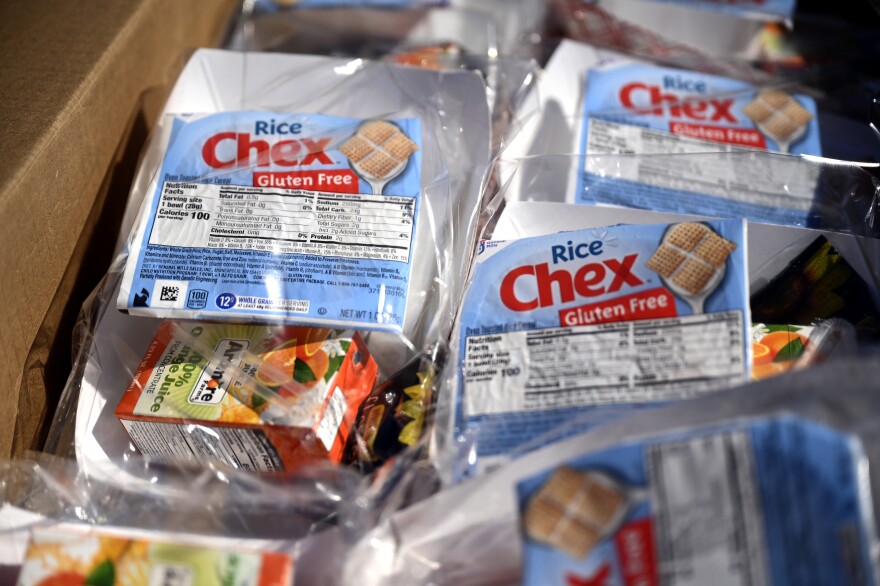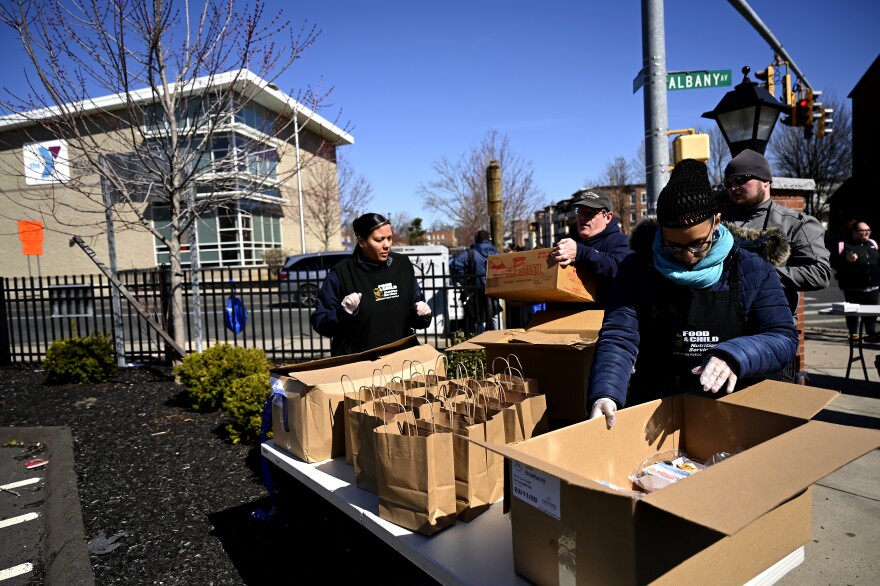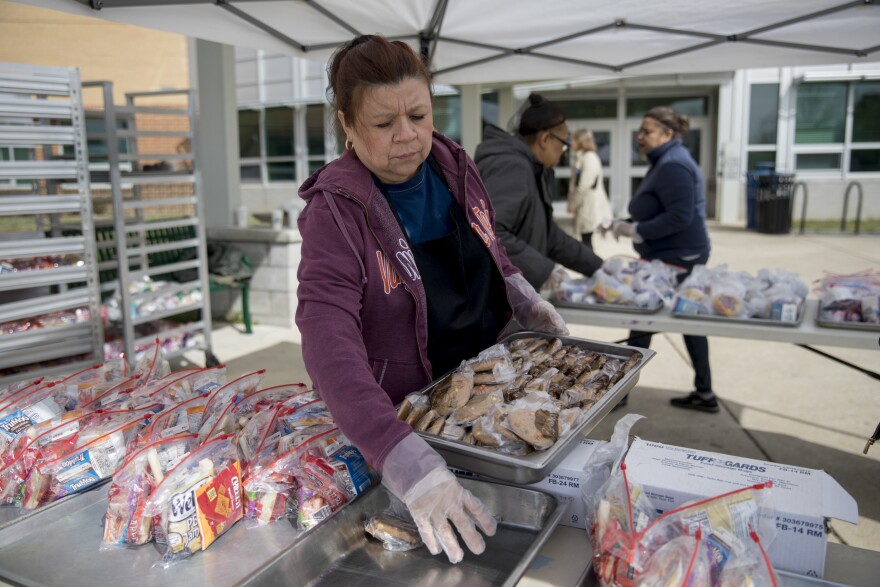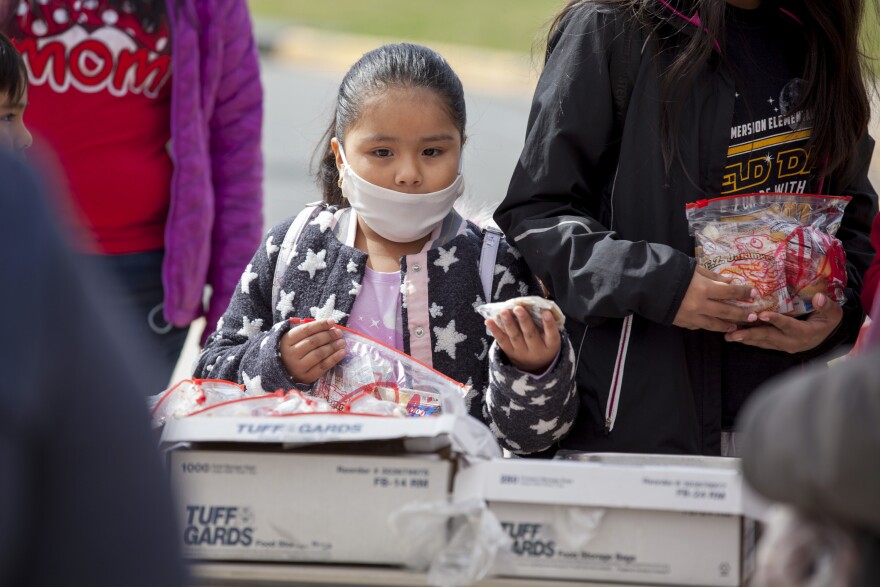Nearly 30 million children in the U.S. count on schools for free or low-cost breakfast, lunch, snacks and sometimes dinner — but most of those children are now at home. At least 114,000 public and private schools have been closed to slow the spread of the coronavirus, affecting the vast majority of the nation's K-12 students, according to an ongoing tally by Education Week.
The school lunch program is the second-biggest anti-hunger initiative in the country, after SNAP, or food stamps. And while classes may be cancelled, school leaders are working hard to make sure kids have food to eat.

"I think that I actually am making plans in my sleep," says Susan Enfield, superintendent of Highline Public Schools, a district near Seattle. She says her schools are closed this week, and roughly two-thirds of her students qualify for free or low-cost school meals. "So I'm not sure how much real sleep I'm getting, 'cause I wake up with a to-do list already ready to go."
"This is unprecedented," says Lisa Davis, senior vice president of the No Kid Hungry Campaign. "We're making up the playbook as we go along."
Katie Wilson agrees. She's executive director for the Urban School Food Alliance and a former deputy undersecretary at the U.S. Department of Agriculture under President Obama.

"I've never been in a situation like this where we really are at a crisis point and where it's going to be very difficult for children to get access to food," Wilson says. "I mean, we've had some situations — natural disasters, things like that — where we've dealt with things, but nothing like this where we don't see any end in sight or how we're actually going to manage it all."
Officials in many districts say they're adapting the playbook they use to feed kids in the summer: grab-and-go meals, handed out at select school sites. These bagged or boxed meals often include lunch as well as breakfast for the following day — think sandwiches and milk, supplemented with lots of nonperishables (chips, granola bars, fruit cups, juice boxes).

Cities around the country are using this grab-and-go model, including New York, Atlanta, Detroit, Milwaukee and Washington, D.C.
But Lisa Davis says, while schools and communities are doing "heroic" work, some children still won't have access to the meals they need. For example: children staying with grandparents who are isolating themselves, or those with parents who work low-wage, hourly jobs with no time off and no option to work from home or drive to school to pick up meals.

That's why some districts are scrambling to do something more direct:
"Make the food, put it on school buses and then have our bus drivers drive routes," says Karen Brown, nutrition services director for Franklin Pierce Schools, in Tacoma, Wash. "Take it to our highest-needs apartment complexes and housing areas so that way the kids can just come to the bus rather than find a way to get to the school."
Loudoun County Public Schools in Virginia and the Metropolitan School District of Wayne Township in Indiana are also using buses to deliver meals. Member station WBUR reports that in Cambridge, Mass., the city has partnered with an anti-hunger organization to deliver food to neighborhoods where many families who rely on school lunches live.

In the Franklin Pierce school district, bus driver Tony Reed told member station KNKX that he gave out 48 lunches on his first day of delivery. He says he loves being able to maintain a daily connection with the kids.
"Just to let them know that I'm here and I care, even though I'm not driving 'em today," Reed says. "They get a smiling face, a great attitude. And, 'Hey, I'll be here tomorrow ... here every day. So, come on: Eat!' "

Brown says counselors may soon join Reed on his bus routes, to check in with kids.
The federal government is also beginning to help. One of Congress' big coronavirus aid packages includes a provision inspired by a program created a decade ago, during the H1N1 outbreak. It would essentially take the value of school meals and transfer it directly to families who are already enrolled in SNAP, or food stamps. The extra money would appear on their SNAP EBT cards, which work like debit cards, and can be used anywhere groceries are sold.

The following member station reporters contributed to this report: Ashley Gross , Carrie Jung , Emily Files , Sascha Raiyn , Eric Weddle , Debbie Truong and Martha Dalton .
Copyright 2020 NPR. To see more, visit https://www.npr.org.



